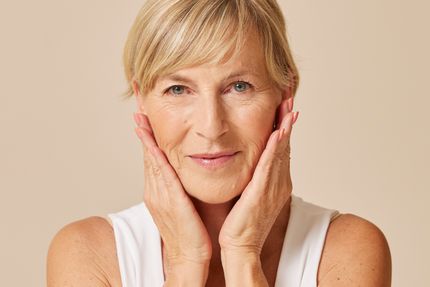Vaginal dryness and menopause
Approximately 30 percent of menopausal women experience vaginal dryness, irritation, itching or pain to some degree. Most women get these symptoms when they hit menopause, or just after. What symptoms occur is different for each woman. Some experience vaginal dryness, others vaginal itching or soreness, or a combination of these symptoms. These uncomfortable or painful symptoms are caused by a decrease in oestrogen. What exactly is happening in your body? And what can you do to relieve vaginal dryness and discomfort?

I've been struggling with vaginal dryness, soreness and itching for the past six months. I also have small sores inside my vagina. I can’t even ride my bike anymore. It’s a nuisance! - Karin (age 50)

What is happening in your body?
When it comes to vaginal health, oestrogen plays a critical role: it helps maintain blood flow and keeps mucous membranes of the vagina wall healthy. Oestrogen also helps maintain thickness of the vaginal lining, and keeps the vagina moist and the tissue flexible. This is important for vaginal health (and to prevent bacteria and fungi from causing infections) and for moistening the vagina in preparation for sexual activity.
Oestrogen levels drop during menopause. This can have an impact on the vagina. It can negatively impact vaginal blood flow and lubrication. It often also leads to the mucous membranes of the vagina becoming thinner, less elastic and more susceptible to tears. This can cause problems down under. Itching, irritation, a burning sensation or soreness are common symptoms for many menopausal women. Unfortunately, these symptoms don’t go away on their own, but they are treatable.
Many women experience a host of symptoms as they go through menopause, such as hot flashes, sleep problems and mood swings.
What can you do?
Menopausal vaginal symptoms can be very uncomfortable. Riding a bike may feel like sitting on a bed of thorns. Or itching may make you feel terribly uncomfortable at work. Of course, you want to get rid of these symptoms or prevent them from occurring in the first place. Looking after yourself and your vaginal health can help alleviate vaginal symptoms. Here are some helpful tips.
- Allow plenty of time for having sex and for foreplay. Vaginal dryness is a common problem for menopausal women. Even though it may take a while longer to get wet, you shouldn’t let this stop you from being intimate with your partner or lover. Sex and masturbation keep the mucous membranes moist and healthy. It also helps to use lubricants.
- Do not wear tight or abrasive clothing. This can cause irritation.
- Avoid using intimate hygiene products. These can disrupt the vaginal flora.
- Getting plenty of rest and eating a healthy diet contribute to a healthy vaginal flora.

Medication for vaginal dryness
Vaginal dryness is a common problem during menopause. It can reduce your quality of life and interfere with sexual intimacy. Are adjustments to your diet and lifestyle not enough to relieve the symptoms? Then medication can help.

What treatments can help?
There are several options for treating vaginal dryness. If diet and lifestyle changes do not provide sufficient relief, then systemic or local hormone replacement therapy (HRT) might be an option.
Hormone therapy for vaginal dryness
Hormone replacement therapy (HRT) supplements the body with hormones that are lost during menopause. This type of therapy can help with symptoms like vaginal dryness, itching and other vaginal health issues. You may start feeling a difference within a few days. HRT for vaginal symptoms can be used locally as a vaginal suppository or cream (e.g., Estriol cream). Local treatment with hormone creams or suppositories is preferred to treat vaginal dryness alone. If you have other symptoms besides vaginal dryness or discomfort, you could also consider an oral HRT, such as Activelle (Kliovance) or Novofem.
Non-hormonal medication
There are various over-the-counter (OTC) moisturisers or lubricants for vaginal dryness. These creams replenish lost moisture in the vaginal tissue to reduce dryness. Note: opt for a cream or ointment without any fragrances or preservatives that might irritate your skin. Ask your pharmacist for advice if you are unsure.

I’ve recently started using an oestrogen cream and spend more time on foreplay. Sex is much more enjoyable again. – Ingrid (age 52)

Sources
- International Menopause Society. Urogenital Problems. https://www.menopauseinfo.org/wp-content/uploads/2023/09/IMS-Factsheet-13-urogenital.pdf
- Muhleisen AL, Herbst-Kralovetz MM. (2016). Menopause and the vaginal microbiome. PMID: 27451320.
- Calleja-Agius J, Brincat MP. (2015). The urogenital system and the menopause. PMID: 26366796.
- Faubion SS, Sood R, Kapoor E. (2017). Genitourinary Syndrome of Menopause: Management Strategies for the Clinician. PMID: 29202940.
- WebMD, Todd N, MD. (2023). Vaginal Dryness: Causes and Moisturizing Treatments. https://www.webmd.com/women/vaginal-dryness-causes-moisturizing-treatments
Your path to a smooth menopausal transition starts her
Get the tools you need to navigate menopause with more ease and to educate yourself about your body. With tips and insights from experts, and relatable stories of women just like you. Press play, not pause.
Tips and advice


FAQ
I have vaginal dryness. Is it OK to use a lubricant?
Yes, using a lubricant can help to relieve any pain or discomfort you may experience during sex. Vaginal dryness is a common problem for menopausal women. Even though it may take a while longer to get wet, you shouldn’t let this stop you from being intimate with your partner or lover.












